Astronomy
Astronomy is the study of celestial objects such as stars, planets, comets, and galaxies, as well as the phenomena that occur outside the Earth's atmosphere. It is a fascinating field that explores the origins and evolution of the universe, as well as the processes that govern the behavior of celestial bodies.
Key Concepts in Astronomy
- Stars: Stars are massive, luminous spheres of plasma that emit light and heat through nuclear fusion. They are the building blocks of galaxies and play a crucial role in the formation of planetary systems.
- Planets: Planets are celestial bodies that orbit a star, are massive enough to be rounded by their own gravity, and have cleared their neighboring region of other objects.
- Galaxies: Galaxies are vast systems of stars, gas, dust, and dark matter bound together by gravity. They come in different shapes and sizes, and contain billions to trillions of stars.
- Comets: Comets are icy bodies that orbit the Sun and develop a glowing coma and tail when they are close to the Sun. They are considered remnants from the early formation of the solar system.
- Cosmology: Cosmology is the study of the origin, evolution, and eventual fate of the universe. It seeks to understand the large-scale structure and dynamics of the cosmos.
Study Guide
To understand astronomy, it's important to grasp the following concepts:
- Learn about the different types of celestial objects, including stars, planets, galaxies, and comets.
- Explore the methods and tools used in astronomy, such as telescopes, spectroscopy, and space probes.
- Understand the principles of celestial motion, including the orbits of planets, the phases of the Moon, and the apparent motion of stars in the night sky.
- Study the history of astronomy, including the contributions of famous astronomers such as Copernicus, Galileo, and Hubble.
- Examine the current theories and discoveries in cosmology, such as the Big Bang theory, dark matter, and dark energy.
By delving into these topics, you can develop a deeper appreciation for the wonders of the universe and the ongoing quest to unravel its mysteries.
.◂Science Worksheets and Study Guides Sixth Grade. Earth's Atmosphere
Study Guide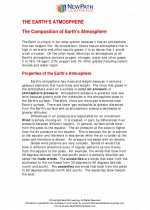 Earth's Atmosphere
Earth's Atmosphere  Activity Lesson
Activity Lesson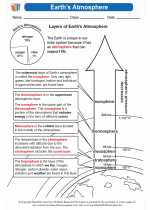 Earth’s Atmosphere
Earth’s Atmosphere  Worksheet/Answer key
Worksheet/Answer key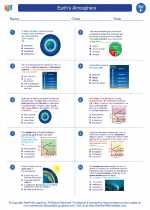 Earth's Atmosphere
Earth's Atmosphere  Worksheet/Answer key
Worksheet/Answer key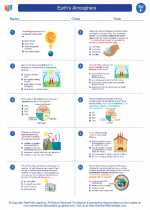 Earth's Atmosphere
Earth's Atmosphere  Worksheet/Answer key
Worksheet/Answer key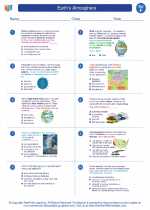 Earth's Atmosphere
Earth's Atmosphere  Worksheet/Answer key
Worksheet/Answer key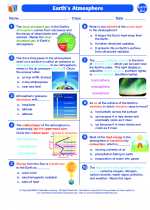 Earth's Atmosphere
Earth's Atmosphere  Vocabulary/Answer key
Vocabulary/Answer key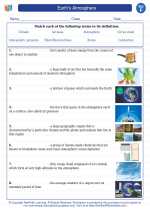 Earth's Atmosphere
Earth's Atmosphere  Vocabulary/Answer key
Vocabulary/Answer key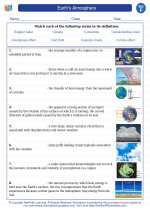 Earth's Atmosphere
Earth's Atmosphere  Vocabulary/Answer key
Vocabulary/Answer key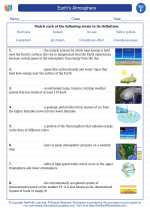 Earth's Atmosphere
Earth's Atmosphere  Vocabulary/Answer key
Vocabulary/Answer key Earth's Atmosphere
Earth's Atmosphere  Vocabulary/Answer key
Vocabulary/Answer key Earth's Atmosphere
Earth's Atmosphere  Vocabulary/Answer key
Vocabulary/Answer key Earth's Atmosphere
Earth's Atmosphere  Vocabulary/Answer key
Vocabulary/Answer key Earth's Atmosphere
Earth's Atmosphere 

 Activity Lesson
Activity Lesson
 Worksheet/Answer key
Worksheet/Answer key
 Worksheet/Answer key
Worksheet/Answer key
 Worksheet/Answer key
Worksheet/Answer key
 Worksheet/Answer key
Worksheet/Answer key
 Vocabulary/Answer key
Vocabulary/Answer key
 Vocabulary/Answer key
Vocabulary/Answer key
 Vocabulary/Answer key
Vocabulary/Answer key
 Vocabulary/Answer key
Vocabulary/Answer key
 Vocabulary/Answer key
Vocabulary/Answer key
 Vocabulary/Answer key
Vocabulary/Answer key
 Vocabulary/Answer key
Vocabulary/Answer key

The resources above cover the following skills:
EARTH AND SPACE SCIENCE
Earth’s Systems
Use models (e.g., diagrams, maps, globes, digital representations) to explain how the rotation of Earth and unequal heating of its surface create patterns of atmospheric and oceanic circulation that determine regional climates.